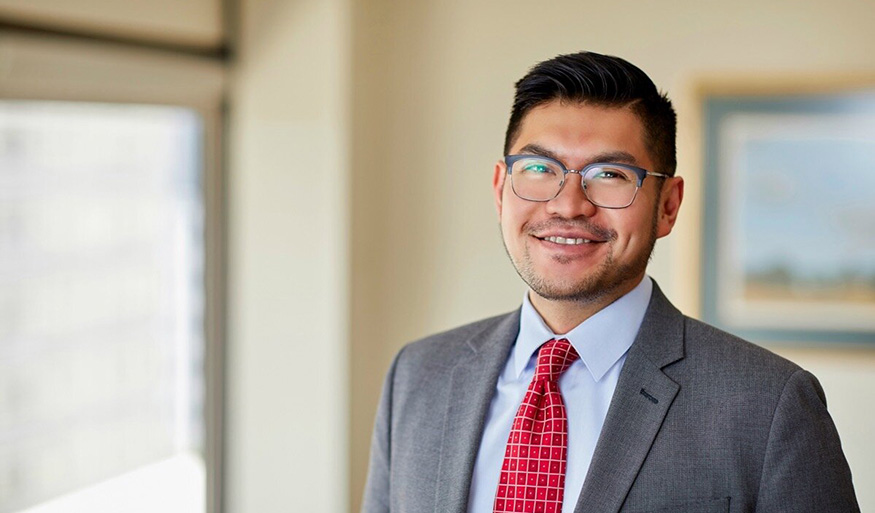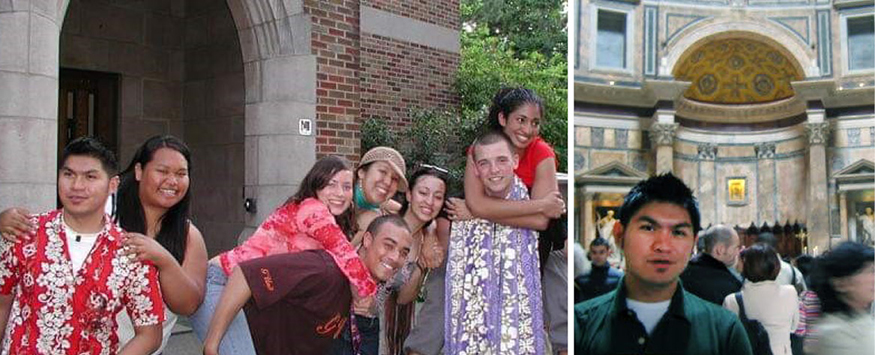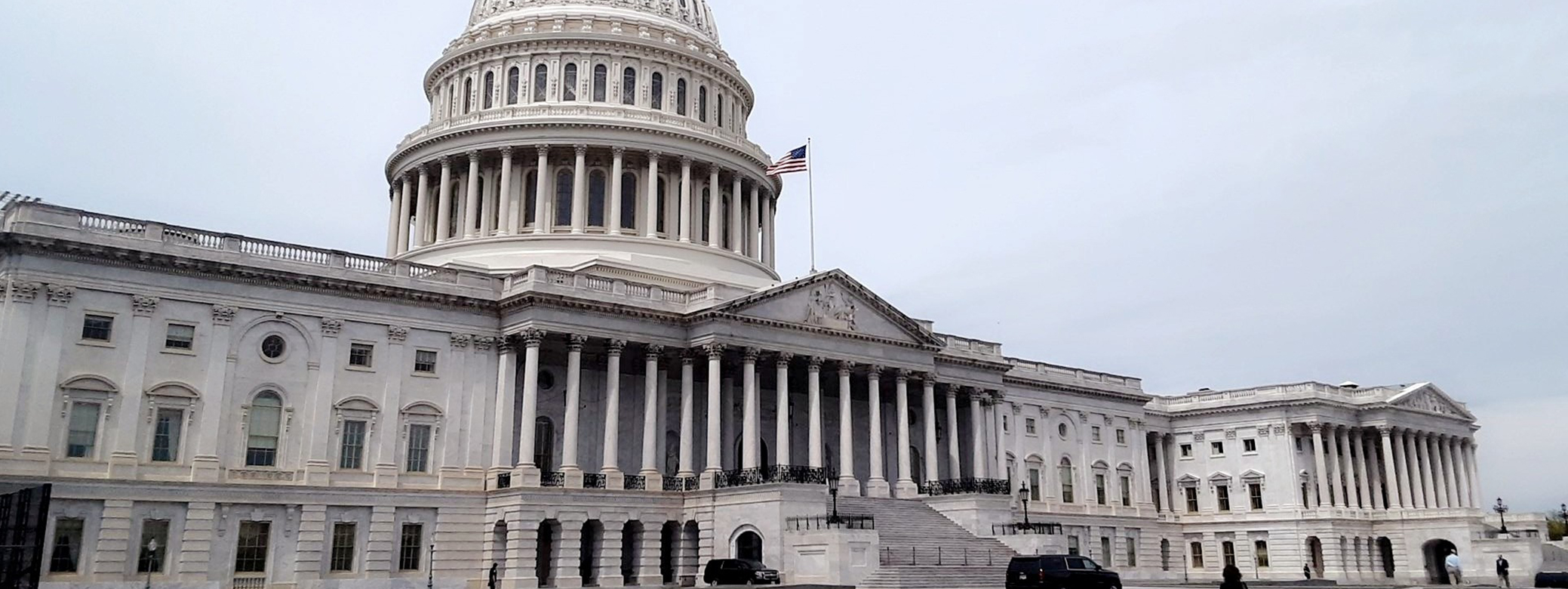
Growing up on the island of Guam, nearly 8,000 miles from Washington, DC, Paulo G. Pontemayor could not have imagined that years later he’d receive a 2024 Top Lobbyist award from the National Institute of Lobbying & Ethics or be included in a list of 40 minority health leaders under the age of 40. But by the time Pontemayor (BA, American Ethnic Studies; Law, Societies & Justice, 2005) graduated from the University of Washington, the seeds of his future success had already taken root.
“The University helped me figure out where I could make the most impact,” he says.
Pontemayor is currently senior director of government relations at the Catholic Health Association of the United States (CHA), the national leadership organization of more than 2,200 Catholic health care systems, hospitals, long-term care facilities, and related organizations. An important focus of CHA is increasing equity and access to health care in the United States.
“It’s the role I had always wanted,” Pontemayor says. “It was very meaningful for me to get this job.”
A Foundation for Success
Pontemayor came to the UW with plans for a career in medical technology, but he was drawn to courses in the social sciences. He convinced his parents that following his interests in politics and policy would lead to greater success than pursuing a medical career. “I think that was my very first success in lobbying, being able to convince my parents that I should go that track,” he says.
He majored in American ethnic studies and law, societies & justice, both in the College of Arts & Sciences, which provided a foundation he has built on throughout his professional career.
“Coming from Guam, I didn’t necessarily understand what my place was in American society,” Pontemayor says. “American ethnic studies gave me the tools to understand how impactful our family stories are and the activism we’ve been involved in. It was an empowering and very informative major. And LSJ was a focused way of looking at how laws have impacted different groups of people.”

Leadership experiences at the UW also prepared Pontemayor for life after college. He served as a student senator for the Filipino American Student Association, as a commissioner with the Pacific Islander Student Commission (part of ASUW, the student government), and as a student advisory council member for the UW Office of Minority Affairs & Diversity. He also found community at the Catholic Newman Center, which supports Catholic students at the UW.
“Being part of student organizations, I learned that leadership is both a noun and a verb,” Pontemayor says. “You can be a leader, but you also need to execute and inspire others to help them achieve their full potential.”
A Focus on Public Health
Pontemayor’s first job after college was serving as campaign manager for a Washington State House of Representatives candidate. Other campaign manager positions followed, until Pontemayor was awarded an Asian Pacific American Institute for Congressional Studies (APAICS) Fellowship to work in Washington, DC for Congressman Xavier Becerra, now US Secretary of Health and Human Services. That led to other legislative roles on Capitol Hill, all with a health care focus, including work on the Affordable Care Act.
As Pontemayor delved deeper into health care policy, he decided to pursue a master of public health degree at The George Washington University. After receiving his MPH, he joined the US Department of Health and Human Services as an advisor to the assistant secretary for legislation.
I learned that leadership is both a noun and a verb. You can be a leader, but you also need to execute and inspire others to help them achieve their full potential.
“Being able to implement Obamacare administratively at the federal level was so eye-opening,” he says, “especially because I had been on the other side, working on it legislatively.”
Yet Pontemayor was ready to venture beyond government jobs. Recognizing the role of hospitals in improving public health, he joined The Joint Commission, the nation’s largest not-for-profit health care accreditor, which advocates for a standard of quality in hospitals and other health care settings. As the commission’s associate director of federal relations, he got his first taste of lobbying — a role he believes is often misunderstood.
“Lobbying is something all of us do,” he says. “At the national level, it’s a way for us to take the interests of the organizations or stakeholders or groups that we’re part of and tell members of Congress or federal agencies what’s missing and what would make it better. It is a very citizen-centric approach to the way we want our institutions, especially our elected officials, to act.”
The Dream Job
Lobbying is also an important part of Pontemayor’s current job at the Catholic Health Association. Taking on this role has been tremendously satisfying for Pontemayor, who admired CHA and its focus on marginalized groups since his days working in Congress.
“This is the role I always wanted,” Pontemayor says. “It gets back to the Catholic teaching I grew up with. I was educated by the Sisters of Mercy, who emphasized being part of the world and pushing for justice where you can.”

A key aspect of Pontemayor’s role at CHA is providing information to congressional staff as they develop health care legislation, with the goal of improving health care access and quality. He also helps develop CHA’s advocacy agenda, the guiding document for the organization’s priorities.
“The vast majority of my job is reading,” says Pontemayor, who is concurrently pursuing a doctorate in public health at Johns Hopkins Bloomberg School of Public Health. “I read a lot of policy papers, a lot of committee hearing reports, a lot of what’s being reported in the news. There is just so much happening in the world of health care, which is about one-sixth of the American economy, so trying to be on top of that for the organization is a huge part of the job.”
Pontemayor’s focus on government relations reflects his belief that the federal government has a huge part to play in improving the quality of care in the US. He says the government, the largest payer of health care in the US, has made great strides in standardizing care, promoting patient safety, and protecting consumers from spiraling costs. Yet there is much still to be done.
“The government has developed polices that are getting us closer to universal coverage, but we’re not there yet,” he says. “That is a big area of focus for CHA, along with access.”
Asked what challenges or opportunities a change of administration might mean for his job, Pontemayor is circumspect.
“I think with health care, we are insulated from radical changes because health care is a huge part of the American economy,” he says. “And the Trump and Biden administrations agree that there should be more transparency around what consumers pay for health care and that we need to control costs in Medicare.
“I am also comforted by the fact that the Catholic Health Association has been around for a long time — it predates both Medicare and Medicaid – and it has worked with many different administrations. The values on which we were founded, and the good work that our member hospitals do, transcends any political ideology or administration. So I’m optimistic that things won’t change too much — but ask me again in about seven months.”
More Stories

Finding Love at the UW
They met and fell in love as UW students. Here, 10 alumni couples share how they met, their favorite spots on campus, and what the UW still means to them.

AI in the Classroom? For Faculty, It's Complicated
Three College of Arts & Sciences professors discuss the impact of AI on their teaching and on student learning. The consensus? It’s complicated.

Bringing Music to Life Through Audio Engineering
UW School of Music alum Andrea Roberts, an audio engineer, has worked with recording artists in a wide range of genres — including Beyoncé.
